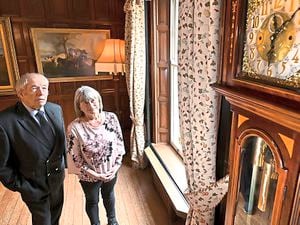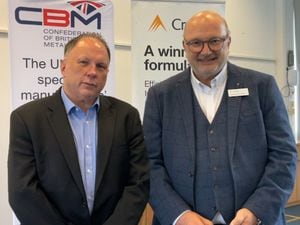Cheap booze kills off the quiet pint
'The whole culture of having a quiet pint has gone – now people are going out intending to get slaughtered.'
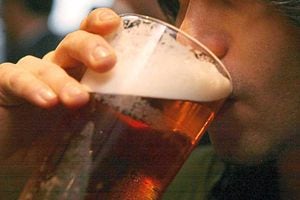
As someone who has dedicated his career to helping alcoholics, Dr Ash Kahn is better qualified than most to talk about Britain's spiralling booze problem.
The retired consultant psychiatrist, who worked throughout the West Midlands, believes urgent action is needed to tackle the issue.
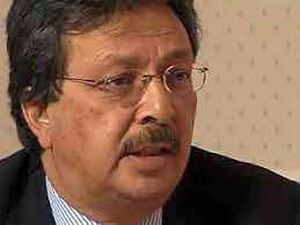
And as new figures reveal thousands of hospital admissions are being caused by alcohol, the debate over what needs to be done is likely to intensify.
Drink is cheaper than ever in supermarkets, with promotions encouraging people to buy two or three boxes of beer at a time. And Dr Kahn argues pubs and clubs have been allowed to run bulk buy deals and cut prices at peak times.
The Express & Star revealed yesterday that the number of people being admitted to hospitals across the Black Country because of alcohol was higher than the average across England for 2013/14.
In Wolverhampton there were 1,566 people per 100,000 admitted due to booze, compared to 1,393 in Sandwell, 1,373 in Dudley and 1,321 in Walsall, with 1,105 in Staffordshire. The England average is 1,253.
But the figures also show a further drop in the rate of hospital admissions due to alcohol among under 18s, which Public Health England said was evidence of a continuing decline in young people's harmful drinking.
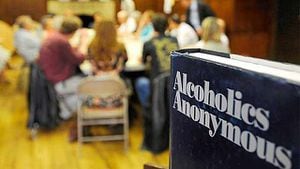
Alcoholics Anonymous was founded 80 years ago today in America but now has groups across the world.
AA states that its primary purpose is to help alcoholics 'to stay sober and help other alcoholics achieve sobriety'.
Founding members and recovering alcoholics Dr Bob Smith and Bill Wilson popularised the teachings of the Oxford Group, an evangelical Puritan network that encouraged acknowledging your weakness, making amends to those you have harmed, and trusting God for salvation.
Today, AA has more than 90,000 groups in 141 countries, with approximately five million individuals attending at least one meeting a year.
And the traditions of AA have slipped into popular culture, with even many who never attended a meeting able to mimic the rituals of first-name introductions. Organisers also encourage their members to refrain from speaking about any issues that come up in meetings. A message on AA's website states: "AA is concerned solely with the personal recovery and continued sobriety of individual alcoholics who turn to the fellowship for help. Alcoholics Anonymous does not engage in the fields of alcoholism research, medical or psychiatric treatment, education, or advocacy in any form, although members may participate in such activities as individuals.
"The fellowship has adopted a policy of 'co-operation but not affiliation' with other organisations concerned with the problem of alcoholism. Traditionally, AA does not accept or seek financial support from outside sources."
Central to AA's work is the 12-step programme. They are:
We admitted we were powerless over alcohol - that our lives had become unmanageable
Came to believe that a Power greater than ourselves could restore us to sanity
Made a decision to turn our will and our lives over to the care of God as we understood Him
Made a searching and fearless moral inventory of ourselves
Admitted to God, to ourselves and to another human being the exact nature of our wrongs
Were entirely ready to have God remove all these defects of character
Humbly asked Him to remove our shortcomings
Made a list of all persons we had harmed, and became willing to make amends to them all
Made direct amends to such people wherever possible, except when to do so would injure them or others
Continued to take personal inventory and when we were wrong promptly admitted it
Sought through prayer and meditation to improve our conscious contact with God as we understood Him, praying only for knowledge of His will for us and the power to carry that out
Having had a spiritual awakening as the result of these steps, we tried to carry this message to alcoholics and to practice these principles in all our affairs
However Dr Kahn is in no doubt that the number of people with alcohol-related problems has rocketed during his career – and he is concerned it will only get worse. In particular, in the latter part of his career he saw an increase in the number of young people becoming addicted to alcohol. And he says this can only be explained by the dramatic change in attitudes to drinking between the generations. He said: "I think the alcohol strategy that was put out a few years ago encouraged people to change their drinking patterns and start binging.
"The whole culture of going for a quiet pint has gone – now people are going out intending to get slaughtered.
"The pro-alcohol lobby got Tony Blair to support the notion that people will drink responsibly if you loosen licensing laws. There is also the problem of alco-pops, that make the transition from non-alcoholic drinks to alcohol very easy."
Dr Kahn, who worked for the Birmingham and Solihull Mental Health NHS Foundation Trust until he retired two years ago, said the support is out there but many people do not know where to go to access it.
He is a trustee of Alcoholics Anonymous, which was formed 80 years ago today, and passionately believes it is one of the best ways of helping addicts in their long term recovery. He said: "There is the support there, but sometimes people don't know about it or perhaps they don't want to turn to it and admit they do have a problem. AA is available 24 hours a day and is confidential – and it works. I think the whole notion of self-help is key. Most people, when they realise they have got a problem can instigate changes themselves, but they don't realise the nature and extent of the problems they have."
Drinking is often used as a way of blocking out emotions – and this has become more common since the recession as people have lost their jobs and struggled to make ends meet, Dr Kahn added.
But drinking heavily not only costs money but stops them dealing with their problems, with many ending up homeless or estranged from their families.
"The economic situation means people are turning to alcohol as a relief from the dire straits they are in," Dr Kahn said. "Alcohol is easily available and often seems like a short term solution. There is this idea that someone could never become an alcoholic and that they just like a drink, but all you have to do is drink a lot regularly, and this will result in your whole body chemistry changing.
"You don't become an alcoholic overnight – it is something that can happen very surreptitiously over the years when someone's whole relationship with alcohol changes."
Health bosses have admitted there is still plenty of work to do and they have backed up Dr Kahn's concerns. Professor Kevin Fenton, director of health and well-being at PHE, said: " The decline in hospital admissions from alcohol for under 18s is promising, but current levels of harm caused by alcohol remain unacceptably high, especially within the most deprived communities, who suffer the most from poor health in general.
"Much of this harm is preventable and we need further action to implement the most effective evidence based policies. Public Health England will continue to provide leadership and support to local areas to reduce the devastating harm that alcohol can cause to individuals, families and communities."
Dr Kahn is confident that if enough people back the calls for minimum pricing, it will eventually happen. But he acknowledges that there needs to be a change in attitude from the Government and a commitment to taking what some might see as drastic action.

He said: "Everyone knows that if you increase the cost of alcohol the number of people at risk from heavy drinking will decrease.
"In Scotland they successfully passed the minimum pricing laws but the alcohol manufacturers then appealed to the European courts. The Government also needs to reduce the stigmatisation attached to alcohol recovery networks and people should be encouraged to think about AA as a means to doing something positive about their lives.
"It has helped more people get on the road to recovery than anything else in the NHS and everyone needs to realise this."


